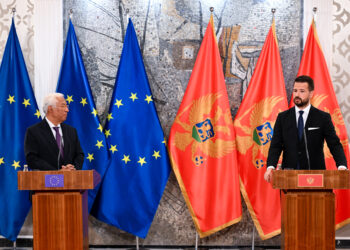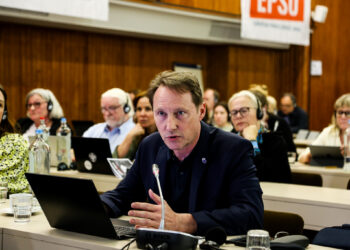The European Economic and Social Committee (EESC) recently adopted the opinion on the New Growth Plan for the Western Balkans and convened a High-Level Civil Society Conference in Ljubljana, Slovenia on 24 May, marking a significant milestone in the EU integration process for the Western Balkans. The conference’s final declaration adopted by the participants concluded with a series of comprehensive recommendations and commitments aimed at facilitating socio-economic convergence, reinforcing fundamental reforms, and fostering regional cooperation.
Participants at the conference lauded the renewed commitment to socio-economic convergence and reforms as outlined in the New Growth Plan and the Reform and Growth Facility for the Western Balkans. These frameworks are pivotal for aligning the region with EU standards, fostering economic growth, and improving governance structures.
The EESC opinion and final declaration underscored the importance of a gradual, predictable, and merit-based approach to the EU accession process. This strategy ensures that candidate countries progressively benefit from increased integration, provided they meet the stringent conditions set by the EU. The robust conditionality approach, which ties funding to compliance and measurable progress on reforms, was particularly welcomed. However, participants called on the European Commission to provide clear guidance on applying these conditions transparently.
 A key theme reiterated during the conference was the need to balance the EU’s focus on stability and geopolitical interests with the preservation of the rule of law and democracy. Ensuring that democratic principles are upheld is essential for maintaining the EU’s core values and fostering genuine political and social reforms in the Western Balkans.
A key theme reiterated during the conference was the need to balance the EU’s focus on stability and geopolitical interests with the preservation of the rule of law and democracy. Ensuring that democratic principles are upheld is essential for maintaining the EU’s core values and fostering genuine political and social reforms in the Western Balkans.
Participants emphasised the importance of supporting candidate countries in evaluating the benefits and challenges of early market integration. This process should involve genuine input from social partners and civil society organisations, ensuring a holistic approach to economic integration. Additionally, there was a strong call to streamline work permit procedures for citizens from the Western Balkans seeking employment in the EU, thereby enhancing labour mobility and economic integration.
Providing direct financial and technical support to Western Balkan companies is crucial to enable them to meet EU export standards. Such support will help these companies obtain the necessary certifications and documentation, facilitating their integration into the EU market.
The final declaration stressed the need to align the Facility Mechanism with EU cohesion policy principles. This alignment is essential for preparing Western Balkan institutions for full access to cohesion policy funding upon EU membership, ensuring that they can effectively manage and make use of these resources.
Investments in social, economic, and territorial cohesion were highlighted as necessary for driving economic growth and job creation in the region. The European Commission was urged to prioritise human capital-related reforms and investments, addressing the currently limited support for these areas under the Economic and Investment Plan.
Participants recommended that the New Growth Plan be supplemented with measures aimed at developing national administrative capacities and those of social and economic partners. Strengthening these capacities is vital for improving the quality of social and civic dialogue in candidate countries.
national administrative capacities and those of social and economic partners. Strengthening these capacities is vital for improving the quality of social and civic dialogue in candidate countries.
In line with the EU partnership principle, the conference stressed the importance of the recommendations from the EESC opinion on the active involvement of social partners and civil society in developing, implementing, monitoring, and evaluating reform agendas. Establishing country monitoring committees, based on the experience with the Recovery and Resilience Facility in EU Member States, was recommended to enhance coordination and oversight.
Regional cooperation and good neighbourly relations were recognised as fundamental throughout the EU accession process. The focus on developing the Common Regional Market was welcomed, but participants stressed the need to step up diplomatic efforts to resolve ongoing political disputes, something that is critical for successful regional cooperation.
The final declaration of the EESC High-Level Civil Society Conference reflects a comprehensive strategy for supporting the Western Balkans on their path to EU membership. By emphasising reforms, inclusive participation, and regional cooperation, the EU aims to foster a stable, democratic, and economically vibrant future for the region.
English version by the Translation Service of Withub









